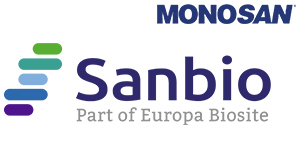Mouse anti-YAP, clone 63.7 (Monoclonal)
Mouse anti-YAP, clone 63.7 (Monoclonal)
Artikelnummer
SANMON10217
Verpackungseinheit
1 ml
Hersteller
Sanbio / Monosan
Verfügbarkeit:
wird geladen...
Preis wird geladen...
Clone Number: 63,7
Immunogen: Recombinant YAP of human origin
Concentration: n/a
Format: Concentrate
Storage buffer: PBS with less than 0.1% sodium azide and 0.1% gelatin
Additional info: The Yes-associated protein, otherwise known as YAP, is a 14-3-3 binding molecule that was originally recognized by virtue of its ability to bind to the SH3 domain of Yes. The binding of YAP to 14-3-3 requires the phosphorylation of a homologous serine residue (Ser 112) in the YAP 14-3-3 binding motif. The highly conserved and ubiquitously expressed 14-3-3 proteins regulate differentiation, cell cycle progression and apoptosis by binding intracellular phosphoproteins involved in signal transduction. YAP may link events at the plasma membrane and cytoskeleton to inhibition of transcription in the nucleus in a manner regulated by 14-3-3 proteins. YAP shares homology with the WW domain of TAZ, transcriptional co-activator with PDZ binding motif, which functions as a transcriptional co-activator by binding to the PPXY motif present in transcription factors. YAP is expressed at high levels in the lung, placenta, prostate, ovary and testis. Pretreatment: Heat induced epitope retrieval in 10 mM citrate buffer, pH6.0, for 20 minutes is required for IHC staining on formalin-fixed, paraffin embedded tissue sections. Note: Dilution of the antibody in 10% normal goat serum followed by a goat anti-mouse secondary antibody-based detection is recommended. Control tissue Lung, placenta, prostate, ovary, testis. Staining Nuclear.
References: Ren, Y.R., et al. 2011. S, J. Biol. Chem. 286: 11960-11969./Ellison, D.W., et al. 2011. Acta Neuropathol. 121: 381-396./Cordenonsi, M., et al. 2011. Cell 147: 759-772.
Immunogen: Recombinant YAP of human origin
Concentration: n/a
Format: Concentrate
Storage buffer: PBS with less than 0.1% sodium azide and 0.1% gelatin
Additional info: The Yes-associated protein, otherwise known as YAP, is a 14-3-3 binding molecule that was originally recognized by virtue of its ability to bind to the SH3 domain of Yes. The binding of YAP to 14-3-3 requires the phosphorylation of a homologous serine residue (Ser 112) in the YAP 14-3-3 binding motif. The highly conserved and ubiquitously expressed 14-3-3 proteins regulate differentiation, cell cycle progression and apoptosis by binding intracellular phosphoproteins involved in signal transduction. YAP may link events at the plasma membrane and cytoskeleton to inhibition of transcription in the nucleus in a manner regulated by 14-3-3 proteins. YAP shares homology with the WW domain of TAZ, transcriptional co-activator with PDZ binding motif, which functions as a transcriptional co-activator by binding to the PPXY motif present in transcription factors. YAP is expressed at high levels in the lung, placenta, prostate, ovary and testis. Pretreatment: Heat induced epitope retrieval in 10 mM citrate buffer, pH6.0, for 20 minutes is required for IHC staining on formalin-fixed, paraffin embedded tissue sections. Note: Dilution of the antibody in 10% normal goat serum followed by a goat anti-mouse secondary antibody-based detection is recommended. Control tissue Lung, placenta, prostate, ovary, testis. Staining Nuclear.
References: Ren, Y.R., et al. 2011. S, J. Biol. Chem. 286: 11960-11969./Ellison, D.W., et al. 2011. Acta Neuropathol. 121: 381-396./Cordenonsi, M., et al. 2011. Cell 147: 759-772.
| Artikelnummer | SANMON10217 |
|---|---|
| Hersteller | Sanbio / Monosan |
| Hersteller Artikelnummer | MON10217 |
| Verpackungseinheit | 1 ml |
| Mengeneinheit | STK |
| Reaktivität | Human |
| Klonalität | Monoclonal |
| Methode | Immunohistochemistry (paraffin) |
| Isotyp | IgG2a |
| Wirt | Mouse |
| Konjugat | Unconjugated |
| Produktinformation (PDF) | Download |
| MSDS (PDF) |
|

 English
English







